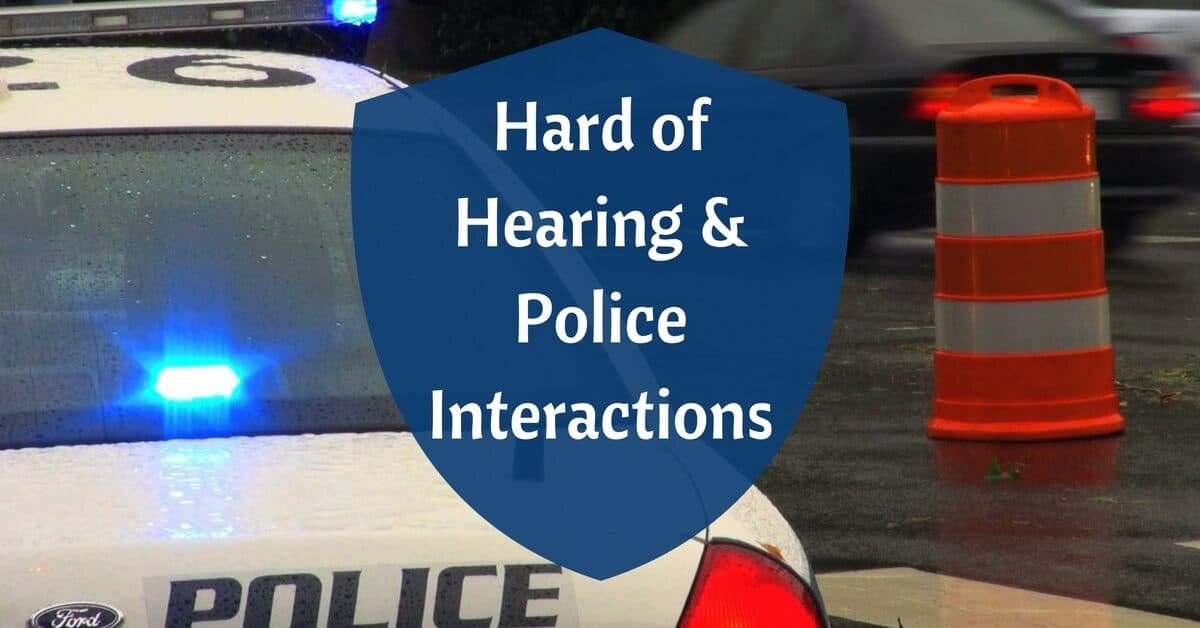Hearing Loss and Police Interactions
Being stopped by the police is an anxiety-producing event under any circumstance. Being stopped by police when one is significantly or profoundly hearing impaired heightens that anxiety-producing experience up several notches to traumatic and terrifying.
Recent news stories of routine traffic stops, involving hearing impaired persons and police officers, with tragic outcomes, point to the need for preparation and education on the part of law enforcement and the hard of hearing.
Police Perspective
Police officers are in daily contact with all types of people, and many have disabilities that create communications challenges. An estimated 9 percent of the population is ASL-Deaf or hard of hearing. So, on the part of law enforcement, the chances of a traffic violation encounter with hearing impaired persons are pretty high.
Americans with Disabilities Act
The Americans with Disabilities Act (ADA) makes it very clear that hearing impaired persons are entitled to the same services from law enforcement as the general population. It is incumbent upon law enforcement to educate and train their officers to learn to recognize and handle such encounters with professionalism and concern for public safety.
The Sad Reality
Unfortunately, while some law enforcement communities have developed training and officer liaison positions for the deaf/hard of hearing, for many more, this training is sorely lacking, underfunded, and not made mandatory. Many law enforcement agencies only become educated on the ADA the hard way, by not complying with the law as stated in the ADA, by being involved in an event that turned poorly by not having the proper training, experience, or accommodation of the rights of individuals with disabilities such as hearing loss.
These terrible tragedies bring these deficiencies to national attention, but it is critical in the aftermath that law enforcement immediately begin to institute changes within their ranks, that they comply with the ADA, and that adequate training be made absolutely mandatory for dealing with the hearing impaired populace. We, the public, must demand this from our governing bodies.
What Can One Do to Protect Oneself?
It is crucial that those with hearing impairment learn what their rights and obligations are, and take steps to prepare as much as possible for such interaction.
The ACLU has teamed up with Academy Award-winning actress Marlee Matlin (who is ASL-Deaf and the wife of a police officer) and advocacy group Helping Educate to Advance the Rights of the Deaf (HEARD) on an American Sign Language video to ensure deaf and hard of hearing people know their rights when interacting with law enforcement.
- This video is an excellent place to start to become educated about what to do if you are stopped by law enforcement and are hearing impaired. This video shows very specifically what to do, what not to do, and what your rights are. There are too many critical points to list here, and the video provides clear instruction on all these points.
Here is the link: aclu.org
- It is a great idea to get a visor card for the deaf or hearing impaired, as well as one for your wallet or pocket. These are available at www.hearinglosshelp.com, and are also available on many states’ DMV sites. The cards state that the driver is hearing impaired or deaf, with instructions for preferred communications on the back.
The visor card should be attached to your visor, not placed in your purse or glove compartment where you will have to fumble for it.
- If you are stopped, unclip the visor card and place it, and your hands, on the steering wheel, and make sure the officer can see and read the card.
- Follow the advice outlined on the video.
If you or a loved one have hearing loss, are hearing impaired, or ASL-Deaf, the video above, along with the visor and wallet cards, can be life-saving and help you to know and protect your rights when interacting with police.
With community awareness, public demand, training, and vigilance, perhaps many of these senseless tragedies can be avoided.
My Hearing Centers
(877) 330-2920
Visit one of our 50 nationwide locations.


